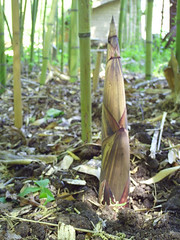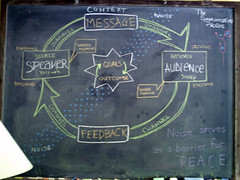
One of the goals here at the ETC is to teach people how to grow their own food. We do that in a number of ways, incorporating both gardening and wildcrafting. Oftentimes, as in the case of our numerous bamboo stands, the line between the two techniques blurs a bit.
As the weather in central Tennessee gets warmer and wetter, our bamboo is doing its best to spread itself out into any path, lawn and garden area it happens to border. Bamboo rarely flowers and seeds. Instead, its root (called a rhizome) sends up new shoots that will eventually grow into the tall, sturdy, wood-like grass that we use around here for our natural building projects. These little dark points may seem like a nuisance to those who don't know their secret: they're food! Ever wonder what the little white, crunchy rectangles in Chinese takeout are? Yup, that's bamboo.
Two days ago, a baking dish full shoots appeared in the kitchen, courtesy of Cliff and the apprentices. They harvested the baby bamboos from the yard in an attempt to control the growth, and we ended up with wild-ish, organic, as local as you can get food. Woot! So far, we've added them to chilli and soup, both of which were inspired by recipes from The New Farm Vegetarian Cookbook. We simply peeled off the tough, dark outer leaves and fried the chopped hearts in olive oil with onions and garlic. Cliff, who is homesteading with his wife and two children, recommends boiling them with pickling spices for a yummy treat. Then, the juice can be used in soups to give them a little kick. Ellie, an intern over at Adam Turtle's nearby bamboo nursery, eats the inside of the young shoots raw! Be aware, though, that some sources say that uncooked bamboo shoots can be toxic and should be parboiled before use.
For a run-down on the nutritional value of this easy-to-grow, easy-to-cook, easy-to-enjoy semi-wild food, check out this article on about.com.


